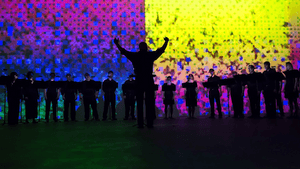Stay in the Loop
BSR publishes on a weekly schedule, with an email newsletter every Wednesday and Thursday morning. There’s no paywall, and subscribing is always free.
When politics meet the avant garde
Philly Fringe 2016: Ted Hearne and The Crossing's 'Sound from the Bench'

Ted Hearne creates art that makes statements on political and social issues. The four pieces The Crossing presented for its FringeArts Curated concert, Sound from the Bench: Political Appropriations by Ted Hearne, dealt with subjects like gender and economic inequality, the war in Iraq, and the Supreme Court’s Citizens United decision.
It’s a type of art that can bring out the worst in many artists. You can always pander to the views of your audience and assume people will applaud anything you do merely because they’re hearing things they agree with.
None of the views expressed in Hearne’s pieces would seem controversial to most of the members of a Philadelphia arts audience. He creates works that are artistically compelling because he adds inventive, challenging music to well-chosen texts. For this performance, in addition, he had the advantage of his pieces being performed by Donald Nally’s unique new music chamber choir. Hearne’s use of techniques like sustained drones requires vocalists who can maintain the kind of intense control Nally’s vocalists applied to every note.
Of thee I sing
In his notes, Hearne says he chose the texts for the opening piece, “Consent,” “to explore my personal relationship to gender inequality and our connection to language that justifies sexual violence.” He took the texts from five sources: love letters to his wife, love letters written by his father, the Catholic Rite of Marriage, a Jewish wedding contract, and statements by two of the defendants in the 2013 Steubenville rape trial.
I eventually gave up trying to follow the complications of the text and listened to the piece as pure music, the way I often listen to classic religious choral works. The music itself, and the interactions between sections of the chorus, expressed all the tension inherent in Hearne’s choice of texts.
The second piece on the program, “Ripple,” reduces the Iraq war to a single sentence taken from a cable: “The marine that engaged from Post Seven was unable to determine the occupants of the vehicle due to the sun coming off the windshield.” The quote refers to an incident in which an American military officer fired on an unidentified vehicle driving toward a checkpoint, killing a mother and injuring her husband and two children.
The starkness of those 24 words reminded me of some of the hard, factual sentences Ernest Hemingway used to convey the realities of other wars. Hearne’s musical effects included a bluesy, crooning opening and a warble that evoked shimmering light in a section devoted to the phrase “of the sun.”
The third item, “Privilege,” had some overdramatized sections, but ended the first half of the program with an irresistible setting of a South African anti-apartheid song.
Political puppetry
The final piece, “Sound from the Bench,” was a mixed bag. Hearne satirized the Citizens United ruling with a text that combined instructions for ventriloquism with quotes from the Justices’s comments on the personhood of corporations. His score added two electric guitars and a percussion section to The Crossing’s vocals, with a predictable effect: Sound from the Bench opened with all the high-decibel noisiness electronic instruments tend to encourage.
The instruments quieted as the piece continued. The guitars even added some touches of real beauty, such as a section in which the two guitars sounded like organs as sopranos sang over them. Hearne’s settings of the justice’s deliberations produced a genuinely funny moment when the whole company exploded into celebration, complete with Alleluias, over the line “These corporations have a lot of money.”
Donald Nally conducted all four pieces with refinement and subtlety. The Crossing and the Philly Fringe make a good fit. Nally’s concerts are sometimes a bit too refined for my personal taste but he is a true proponent of the avant garde, constantly pushing against his audience’s limits.
What, When, Where
Sound from the Bench: Political Appropriations of Ted Hearne. Hearne, "Consent," "Ripple," "Privilege," "Sound from the Bench." The Crossing, Donald Nally conducted. Through Sept. 11, 2016 at Fringe Arts, 140 N. Columbus Blvd., Philadelphia. (215) 413-1318 or fringearts.com.
Sign up for our newsletter
All of the week's new articles, all in one place. Sign up for the free weekly BSR newsletters, and don't miss a conversation.

 Tom Purdom
Tom Purdom